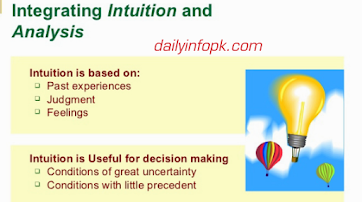Have you ever wondered why some decisions feel so effortless, almost like second nature, while others require intense concentration? The truth lies in the dance between intuition and analytical thinking. When we blend these two, decision-making turns into an art form.
The Double-Edged Sword of Intuition
What is Intuition?
Intuition is that gut feeling. The instant understanding of a situation without the need for conscious reasoning. Like when you meet someone and instantly like or dislike them.
When to Use It?
Intuition is great for quick decisions. It comes in handy during emergencies, when there's no time to ponder. For example, intuition can tell you to avoid a dark alley at night.
The Pitfalls
However, intuition is not always right. It can be influenced by past experiences and biases. Be careful when your intuition says to judge someone based on their appearance.
The Calculative Power of Analysis
What is Analysis?
Analysis is logical reasoning. It's breaking down a problem into smaller parts to understand it better. Think of it like solving a math problem.
When to Use It?
Use analysis for complex decisions. Buying a house? Planning a career move? You'll need to weigh the pros and cons. Here, your analytical mind shines.
The Limitations
Analysis can be time-consuming. It may also lead to "analysis paralysis," where you become too stuck in details to decide.
Striking the Balance
Quick Decisions vs. Long-Term Choices
| Type | Intuition | Analysis |
|---|---|---|
| Quick Decisions | ✓ | |
| Long-Term Choices | ✓ |
The Harmony
The key is to blend intuition and analysis. For daily decisions, a touch of intuition suffices. For long-term choices, let your analytical skills lead but don't dismiss your gut feeling.
Real-world Example
Imagine you're hiring someone. Your intuition might say the candidate is a great fit, but the CV lacks experience. Analyze the CV, but also trust your gut.
Wrapping It Up
Navigating life is like sailing a ship through turbulent waters. Sometimes, you need to trust the wind (intuition); other times, you need to carefully plot your course (analysis). By mastering the art of using both, you turn decision-making into an enriching experience.

